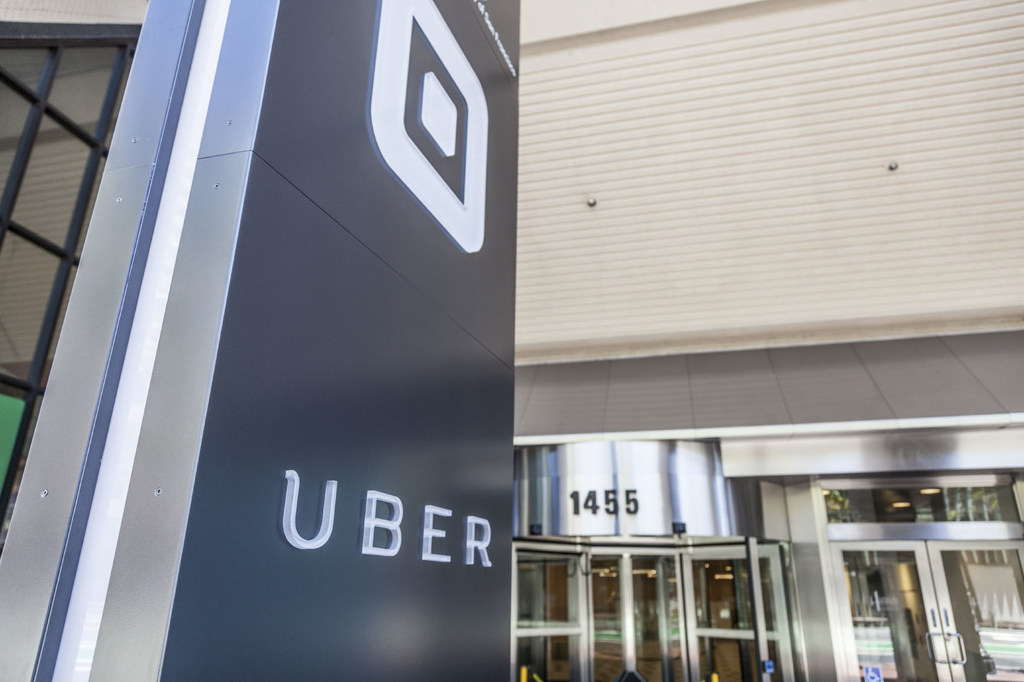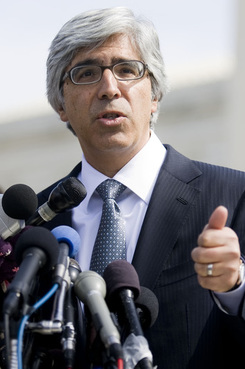Uber's Lawyers Hail Supreme Court's Ruling Against Worker Class Actions
“Epic Systems ends any possible argument that the arbitration agreements should not be enforced,” Gibson Dunn's Theodore Boutrous tells the Ninth Circuit.
June 05, 2018 at 12:09 PM
4 minute read
 Uber offices in California. Credit: Jason Doiy/ The Recorder
Uber offices in California. Credit: Jason Doiy/ The Recorder
Uber Technologies Inc. told a federal appeals court that the recent U.S. Supreme Court ruling that upheld class action bans in employment contracts should defeat claims from the ride-hailing company's drivers that their arbitration agreements are unlawful.
In a consolidated case before the U.S. Court of Appeals for the Ninth Circuit, Uber drivers, who won certification as a class, contend the company has misclassified them as independent contractors and not employees. A federal trial judge concluded Uber's arbitration agreements “are not enforceable as a matter of public policy.”
Uber's lawyers at Gibson, Dunn & Crutcher argue the Supreme Court's decision last month in Epic Systems v. Lewis, which said companies can force workers to arbitrate labor claims, “defeats class certification and requires reversal of the district court's order certifying a class of hundreds of thousands of individuals.”
 Theodore Boutrous
Theodore Boutrous“Epic Systems ends any possible argument that the arbitration agreements should not be enforced,” Gibson Dunn's Theodore Boutrous told the Ninth Circuit, responding to the court's call for the views on how the recent Supreme Court decision affects the litigation.
Boutrous, an appellate partner in the firm's Los Angeles office, said most class members had signed arbitration agreements, and they should be forced to honor these contracts and submit their disputes to individual arbitration.
Uber recently announced it would end forced arbitration for sexual misconduct claims by employees, riders and drivers. The announcement, responding to outside pressure, did not open a door to eliminating all class action waivers. Other companies have also moved to restrict or eliminate arbitration for sexual harassment claims.
Lawyers for the plaintiffs suing Uber include Shannon Liss-Riordan, the Boston-based attorney from Lichten & Liss-Riordan who has long fought gig-economy companies over labor and employment practices.
In a filing Monday in the Ninth Circuit, Liss-Riordan agreed that the one part of the case—whether Uber's arbitration agreements are enforceable under the National Labor Relations Act—”has been decided against the plaintiffs” by the Supreme Court's ruling in Epic Systems.
Still, Liss-Riordan argued that the appeals panel should send the consolidated cases back to the trial court “for further consideration in light of a number of significant new cases that the district court has not yet addressed.” Liss-Riordan said those new cases have “changed the legal landscape” since 2015.
Liss-Riordan put a spotlight on the California Supreme Court's decision last month that is expected to make it harder for on-demand companies, such as Uber and Lyft, to label their workers as contractors and not employees. Business advocates are urging the state court to limit the reach of the ruling to only future matters.
More than half of private-sector employers have mandatory arbitration procedures, and 30 percent of these include class action waivers, the Economic Policy Institute reported in a recent study.
Hundreds of cases in federal appeals courts and at the National Labor Relations Board were on hold pending the outcome of the Supreme Court's Epic Systems decision. The lawsuits were trained on financial institutions, health care and tech giants and household-name retailers, among other defendants. Companies including AT&T Mobility, Bloomingdale's Inc., Neiman Marcus and CVS Pharmacy have cases on hold. In many instances, the NLRB is asking federal appeals court to return the cases to the board for further evaluation in response to the Supreme Court's ruling.
Read more:
Justices, Divided, Say Employment Contracts Banning Class Actions Are Lawful
Supreme Court's Employment Contract Case Will Have Broad Reach. Here's How We Know
Gorsuch Renounces Ginsburg's 'Apocalyptic' Warnings in Landmark Labor Case
Q&A: Lieff Cabraser's Kelly Dermody on Gender-Pay Cases, Arbitration & More
Arbitration After 'Epic Systems v. Lewis': Implications for California Employers
This content has been archived. It is available through our partners, LexisNexis® and Bloomberg Law.
To view this content, please continue to their sites.
Not a Lexis Subscriber?
Subscribe Now
Not a Bloomberg Law Subscriber?
Subscribe Now
NOT FOR REPRINT
© 2025 ALM Global, LLC, All Rights Reserved. Request academic re-use from www.copyright.com. All other uses, submit a request to [email protected]. For more information visit Asset & Logo Licensing.
You Might Like
View All
Meta Hires Litigation Strategy Chief, Tapping King & Spalding Partner Who Was Senior DOJ Official in First Trump Term

Church of Scientology Set to Depose Phila. Attorney in Sexual Abuse Case
5 minute read
$15K Family Vacation Turned 'Colossal Nightmare': Lawsuit Filed Against Vail Ski Resorts

Here's What Corporate Litigators Expect Del. Courts to Address in 2025
6 minute readTrending Stories
- 1'It's Not Going to Be Pretty': PayPal, Capital One Face Novel Class Actions Over 'Poaching' Commissions Owed Influencers
- 211th Circuit Rejects Trump's Emergency Request as DOJ Prepares to Release Special Counsel's Final Report
- 3Supreme Court Takes Up Challenge to ACA Task Force
- 4'Tragedy of Unspeakable Proportions:' Could Edison, DWP, Face Lawsuits Over LA Wildfires?
- 5Meta Pulls Plug on DEI Programs
Who Got The Work
Michael G. Bongiorno, Andrew Scott Dulberg and Elizabeth E. Driscoll from Wilmer Cutler Pickering Hale and Dorr have stepped in to represent Symbotic Inc., an A.I.-enabled technology platform that focuses on increasing supply chain efficiency, and other defendants in a pending shareholder derivative lawsuit. The case, filed Oct. 2 in Massachusetts District Court by the Brown Law Firm on behalf of Stephen Austen, accuses certain officers and directors of misleading investors in regard to Symbotic's potential for margin growth by failing to disclose that the company was not equipped to timely deploy its systems or manage expenses through project delays. The case, assigned to U.S. District Judge Nathaniel M. Gorton, is 1:24-cv-12522, Austen v. Cohen et al.
Who Got The Work
Edmund Polubinski and Marie Killmond of Davis Polk & Wardwell have entered appearances for data platform software development company MongoDB and other defendants in a pending shareholder derivative lawsuit. The action, filed Oct. 7 in New York Southern District Court by the Brown Law Firm, accuses the company's directors and/or officers of falsely expressing confidence in the company’s restructuring of its sales incentive plan and downplaying the severity of decreases in its upfront commitments. The case is 1:24-cv-07594, Roy v. Ittycheria et al.
Who Got The Work
Amy O. Bruchs and Kurt F. Ellison of Michael Best & Friedrich have entered appearances for Epic Systems Corp. in a pending employment discrimination lawsuit. The suit was filed Sept. 7 in Wisconsin Western District Court by Levine Eisberner LLC and Siri & Glimstad on behalf of a project manager who claims that he was wrongfully terminated after applying for a religious exemption to the defendant's COVID-19 vaccine mandate. The case, assigned to U.S. Magistrate Judge Anita Marie Boor, is 3:24-cv-00630, Secker, Nathan v. Epic Systems Corporation.
Who Got The Work
David X. Sullivan, Thomas J. Finn and Gregory A. Hall from McCarter & English have entered appearances for Sunrun Installation Services in a pending civil rights lawsuit. The complaint was filed Sept. 4 in Connecticut District Court by attorney Robert M. Berke on behalf of former employee George Edward Steins, who was arrested and charged with employing an unregistered home improvement salesperson. The complaint alleges that had Sunrun informed the Connecticut Department of Consumer Protection that the plaintiff's employment had ended in 2017 and that he no longer held Sunrun's home improvement contractor license, he would not have been hit with charges, which were dismissed in May 2024. The case, assigned to U.S. District Judge Jeffrey A. Meyer, is 3:24-cv-01423, Steins v. Sunrun, Inc. et al.
Who Got The Work
Greenberg Traurig shareholder Joshua L. Raskin has entered an appearance for boohoo.com UK Ltd. in a pending patent infringement lawsuit. The suit, filed Sept. 3 in Texas Eastern District Court by Rozier Hardt McDonough on behalf of Alto Dynamics, asserts five patents related to an online shopping platform. The case, assigned to U.S. District Judge Rodney Gilstrap, is 2:24-cv-00719, Alto Dynamics, LLC v. boohoo.com UK Limited.
Featured Firms
Law Offices of Gary Martin Hays & Associates, P.C.
(470) 294-1674
Law Offices of Mark E. Salomone
(857) 444-6468
Smith & Hassler
(713) 739-1250






